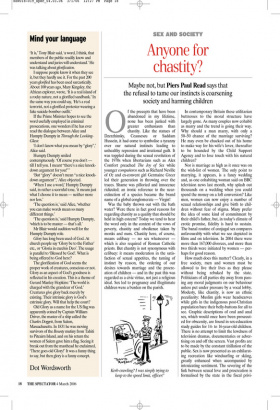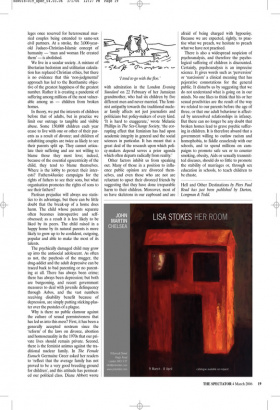Anyone for chastity?
Maybe not, but Piers Paul Read says that the refusal to tame our instincts is coarsening society and harming children Of the precepts that have been abandoned in my lifetime, none has been junked with greater enthusiasm than chastity. Like the statues of Dzerzhinsky, Ceausescu or Saddam Hussein, it had come to symbolise a tyranny over our natural instincts leading to unhealthy repression and irrational guilt. It was toppled during the sexual revolution of the 1970s when libertarians such as Alex Comfort preached The Joy of Sex while younger compañeros such as Richard Neville of Oz and ex-convent girl Germaine Greer led their generation in throwing over the traces. Shame was pilloried and innocence ridiculed; an ironic reference to the nearextinction of a species became the brand name of a global conglomerate — Virgin!
Was the baby thrown out with the bath water? Were there in fact good reasons for regarding chastity as a quality that should be held in high esteem? Today we tend to hear the word only in the context of the vows of poverty, chastity and obedience taken by monks and nuns. Chastity here, of course, means celibacy — no sex whatsoever which is also required of Roman Catholic priests. But chastity is not synonymous with celibacy: it means moderation in the satisfaction of sexual appetites, the taming of instinct by reason, the ordering of our desires towards marriage and the procreation of children — and in the past this was regarded as a civic virtue, not just a religious ideal. Sex led to pregnancy and illegitimate children were a burden on the parish. In contemporary Britain these utilitarian buttresses to the moral structure have largely gone. As many couples now cohabit as marry and the trend is going their way. Why should a man marry, with only a 50–50 chance of the marriage surviving? He may even be chucked out of his home to make way for his wife’s lover, thereafter to be hounded by the Child Support Agency and to lose touch with his natural children?
Nor is marriage as high as it once was on the wish-list of women. The only point to marrying, it appears, is a fancy wedding and, as one cohabiting woman said on BBC television news last month, why splash out thousands on a wedding when you could spend the money on a loft conversion? Like men, women can now enjoy a number of sexual relationships and give birth to children without fear of stigma. Many prefer the idea of some kind of commitment by their child’s father, but, in today’s climate of erotic promise, fidelity is hard to sustain. The banal routine of conjugal sex compares unfavourably with what we see depicted in films and on television. In 2004 there were more than 167,000 divorces, and more than two thirds were initiated by women — perhaps for good reason.
How much does this matter? Clearly, in a free society, men and women must be allowed to live their lives as they please without being rebuked by the state. Politicians of all parties shy away from passing any moral judgments on our behaviour unless put under pressure by a vocal lobby. Modesty, like chastity, is now an ethnic peculiarity: Muslim girls wear headscarves while girls in the indigenous post-Christian population bare their belly-buttons for all to see. Graphic descriptions of oral and anal sex, which would once have been prosecuted for obscenity, are found in sex-education study guides for 14to 16-year-old children. There is no attempt to limit the lewdness of television dramas, documentaries or advertising on and off the screen. Vast profits are to be made by the constant titillation of the public. Sex is now presented as an exhilarating recreation like windsurfing or skiing, greatly enhanced when accompanied by intoxicating sentiment. The severing of the link between sexual love and procreation is formalised by the state in the fiscal privi leges once reserved for heterosexual married couples being extended to same-sex civil partners. At a stroke, the 3,000-yearold Judaeo-Christian-Islamic concept of humanity — ‘man and woman He created them’ — is abolished.
We live in a secular society. A mixture of libertarian hedonism and utilitarian calculation has replaced Christian ethics, but there is no evidence that this ‘non-judgmental’ approach has led to the Benthamite objective of the greatest happiness of the greatest number. Rather it is creating a pandemic of suffering among millions of the most vulnerable among us — children from broken homes.
In theory, we put the interests of children before that of adults, but in practice we limit our outrage to tangible and visible abuse. Some 150,000 children each year cease to live with one or other of their parents as a result of divorce; and children of cohabiting couples are twice as likely to see their parents split up. They cannot articulate their suffering and are not willing to blame those they most love; indeed, because of the essential egocentricity of the child, they tend to blame themselves. Where is the lobby to protect their interests? Fathers4Justice campaigns for the rights of fathers to see their sons, but what organisation promotes the rights of sons to see their fathers?
Partisan prejudice will always use statistics to its advantage, but there can be little doubt that the break-up of a home does harm. The child whose parents separate often becomes introspective and selfobsessed; as a result it is less likely to be liked by its peers. The child raised in a happy home by its natural parents is more likely to grow up to be confident, outgoing, popular and able to make the most of its talents.
The psychically damaged child may grow up into the antisocial adolescent. As often as not, the psychosis of the mugger, the drug-addict and the adult depressive can be traced back to bad parenting or no parenting at all. There has always been crime; there has always been depression; but both are burgeoning, and recent government measures to deal with juvenile delinquency through Asbos, and the vast numbers receiving disability benefit because of depression, are simply putting sticking-plaster over the pustules of a plague.
Why is there no public clamour against the culture of sexual permissiveness that has led us into this mess? First, it has been a generally accepted nostrum since the ‘reform’ of the laws on divorce, abortion and homosexuality in the 1970s that our private lives should remain private. Second, there is the feminist animus against the traditional nuclear family. In The Female Eunuch Germaine Greer asked her readers to ‘reflect that the average family has not proved to be a very good breeding ground for children’, and this attitude has permeated our political class. Diane Abbott wrote with admiration in the London Evening Standard on 22 February of her Jamaican grandmother, who had six children by five different men and never married. The feminist antipathy towards the traditional nuclear family affects not just journalists and politicians but policy-makers of every kind. ‘It is hard to exaggerate,’ wrote Melanie Phillips in The Sex-Change Society, ‘the corrupting effect that feminism has had upon academic integrity in general and the social sciences in particular. It has meant that a great deal of the research upon which policy-makers depend serves a prior agenda which often departs radically from reality.’ Other factors inhibit us from speaking out. Many of those in a position to influence public opinion are divorced themselves, and even those who are not are reluctant to upset their divorced friends by suggesting that they have done irreparable harm to their children. Moreover, most of us have skeletons in our cupboard and are afraid of being charged with hypocrisy. Because we are expected, rightly, to practise what we preach, we hesitate to preach what we have not practised.
There is also a widespread suspicion of psychoanalysis, and therefore the psychological suffering of children is discounted. Certainly, psychoanalysis is an imprecise science. It gives words such as ‘perversion’ or ‘narcissism’ a clinical meaning that has pejorative connotations for the general public. It disturbs us by suggesting that we do not understand what is going on in our minds. No one likes to think that his or her sexual proclivities are the result of the way we related to our parents before the age of three, or that our adult behaviour is affected by unresolved relationships in infancy. But there can no longer be any doubt that broken homes lead to grave psychic suffering in children. It is therefore absurd that a government willing to outlaw racism and homophobia, to fiddle ceaselessly with our schools, and to spend millions on campaigns to promote safe sex or to counter smoking, obesity, Aids or sexually transmitted diseases, should do so little to promote the stability of marriages or, through sex education in schools, to teach children to be chaste.
Hell and Other Destinations by Piers Paul Read has just been published by Darton, Longman & Todd.











































































 Previous page
Previous page